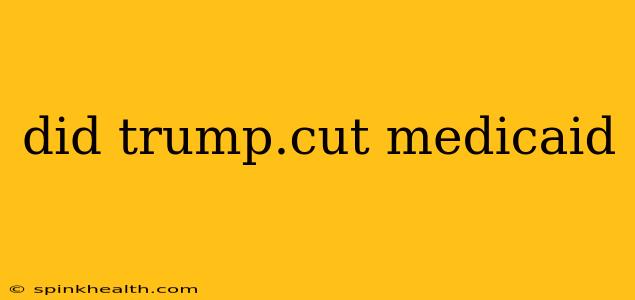The question of whether Donald Trump cut Medicaid is far more nuanced than a simple yes or no. While he didn't directly slash the program with a single, sweeping cut, his administration implemented policies that significantly impacted Medicaid funding and access, leading to a complex and controversial legacy. Let's delve into the specifics.
What Changes Did the Trump Administration Make to Medicaid?
The Trump administration's approach to Medicaid wasn't a straightforward reduction in overall funding, but rather a series of strategic alterations aimed at reshaping the program. These changes included:
-
Promoting Work Requirements: A major push under the Trump administration involved imposing work requirements for Medicaid recipients. The idea was to incentivize employment, but critics argued that these requirements created unnecessary barriers for vulnerable populations, including those with disabilities or chronic illnesses. Several states implemented these requirements, leading to thousands losing coverage. The long-term effectiveness of these requirements remains a subject of ongoing debate among healthcare experts.
-
Pushing for Block Grants: The Trump administration advocated for converting Medicaid's current open-ended funding model to a block grant system. This would have allocated a fixed amount of federal funding to states, giving them more control but potentially limiting the overall resources available to meet the needs of their populations. While this didn't fully materialize during his presidency, it represented a significant shift in the administration’s philosophy towards healthcare funding.
-
Supporting State Waivers: The administration readily approved state waivers that allowed for greater flexibility in Medicaid program design. While some waivers promoted innovation, others led to reduced benefits or stricter eligibility criteria. This resulted in a patchwork of Medicaid programs across the country, with varying levels of access and coverage depending on the state.
-
Reduced Funding for Planned Parenthood: Funding cuts to Planned Parenthood, a significant provider of reproductive health services, including those covered by Medicaid, disproportionately affected low-income women who relied on these services. While this was not a direct cut to Medicaid itself, it reduced access to care for many Medicaid recipients.
How Did These Changes Impact Medicaid Recipients?
The cumulative effect of these policy shifts resulted in a decrease in Medicaid enrollment in several states and reduced access to care for many beneficiaries. Individuals who lost coverage often faced difficulties accessing essential healthcare services, potentially leading to worsened health outcomes.
Did the Trump Administration Actually Reduce Medicaid Spending?
While the Trump administration didn't achieve a direct, dramatic reduction in overall Medicaid spending, the changes implemented indirectly affected spending. Reduced enrollment, tighter eligibility criteria, and restricted access to certain services all contributed to a slower growth rate in Medicaid spending compared to previous administrations. However, the exact impact on overall spending is still a subject of ongoing analysis and debate.
What are the Long-Term Effects of these Changes?
The long-term consequences of these policy changes are still unfolding. Researchers continue to study the effects on healthcare access, health outcomes, and the overall cost of healthcare. The debate over the appropriate role of the federal government in Medicaid funding and program design continues to be a central issue in American healthcare policy.
What are the Arguments For and Against Trump's Medicaid Policies?
Arguments in favor: Proponents of these policies often argue that they promote fiscal responsibility, encourage personal responsibility through work requirements, and provide states with greater flexibility to design programs tailored to their specific needs.
Arguments against: Critics contend that these policies disproportionately harm vulnerable populations, reduce access to essential healthcare, and lead to worse health outcomes. They also argue that block grants are financially risky and undermine the ability of Medicaid to respond effectively to changing needs.
This complex issue requires careful consideration of various factors and perspectives to reach a well-informed understanding. The impact of the Trump administration’s policies on Medicaid continues to be a topic of intense debate and research.

